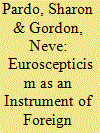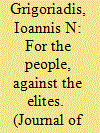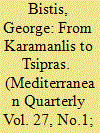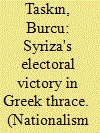|
|
|
Sort Order |
|
|
|
Items / Page
|
|
|
|
|
|
|
| Srl | Item |
| 1 |
ID:
169454


|
|
|
|
|
| Summary/Abstract |
This article advances three arguments about Euroscepticism. First, using Israel as a case study we describe its alliances with Eurosceptic political actors, claiming that while each side hopes to benefit from these alliances to advance particular interests, the attraction among the actors are based on ideological affinities that do not align with the norms informing EU policies. If these norms become more contested, it may make it more difficult to construct a ‘normative power’-based approach in EU foreign policy. Second, we reveal how third parties can use Euroscepticism as an instrument for shaping EU foreign policy. Finally, we expose how this strategy produces a political paradox. By allowing itself to become an instrument deployed by a third party, the Eurosceptic member state also agrees to be pushed back into the fold of the EU apparatus, thus reconstituting itself as an internal actor, one which has stakes in the process and is willing to play by the rules of the game.
|
|
|
|
|
|
|
|
|
|
|
|
|
|
|
|
| 2 |
ID:
171190


|
|
|
|
|
| Summary/Abstract |
While the rise of populism has been a global trend in recent years, it has been prevalent in Greece and Turkey for longer, leaving a strong imprint on the politics of both countries. Left-wing populism has become one of the constitutive elements of the Greek political party system since the collapse of the 1967–1974 military regime. The 2009 outbreak of the Greek economic crisis set the stage for the radicalization of Greek politics through the rise of extremist far-right and far-left populist parties that professed populist agendas of different hues. Such populists accused old-party personnel of being members of a “treacherous elite” that sacrificed Greek national interests against foreign powers. The 2011 “indignados” movement is key for the better understanding of the social dynamics that facilitated the rise of the unusual SYRIZA-ANEL coalition government. Debates on Greek constitutional reform also highlighted the relevance of populism, especially as the SYRIZA-ANEL government sought topics to resonate with its disenchanted voters. On the other hand, a right-wing populist rhetoric has been one of the key instruments for the rise of Turkish political Islam and the establishment of the AKP hegemony in Turkey. Establishing a Kulturkampf-based narrative about the “secularist, ‘white-Turk’ elites” versus the “conservative, ‘black-Turk’ people” was of great political significance. The constitutional reform process proved again crucial for manifesting the relevance of populism in Turkish political discourse. This article explores the circumstances under which left- and right-wing populism have emerged into a dominant feature of Greek and Turkish politics. It also discusses the decreasing relevance of the established left-right political divide in party politics and suggests alternative classifications.
|
|
|
|
|
|
|
|
|
|
|
|
|
|
|
|
| 3 |
ID:
145252


|
|
|
|
|
| Summary/Abstract |
The year 2015 started with a great promise for austerity-harmed people in Greece, but within a few months the promise began to fade as reality sunk in. It was a year that the Coalition of the Radical Left (SYRIZA) achieved a historic electoral triumph in Greece. SYRIZA came to power promising to end the austerity era. However, from its first days in office, the new government realized that keeping this promise would be a far greater challenge than winning the election. Cancelation of the austerity measures required renegotiation of Greece's bailout loans, loans that were conditional on Greece's implementation of these measures. Given that the European lenders had their reasons for setting things up this way, it was not long before Greece's strong anti-austerity drive set the country on a collision course with the eurozone. The negotiations between the two sides are examined in this essay through the perspective of Greece's half-century-long relationship with the European Union and against a backdrop of personal observations and comment, relevant public sentiments, and critical events defining each period discussed.
|
|
|
|
|
|
|
|
|
|
|
|
|
|
|
|
| 4 |
ID:
153598


|
|
|
|
|
| Summary/Abstract |
This article, based on the link between institutional changes and voter behavior, focusing mainly on the 2015 parliamentary elections in Greece and the SYRIZA party's success in Greek Thrace, aims to understand why the Muslim minority voted significantly for SYRIZA and how they managed to send four Muslim representatives to the Greek Parliament, three of them from the same party. The article argues that, although there is massive support for radical-left SYRIZA due to its electoral promises to improve social services in addition to the party's rational candidate nomination, this support reflects a mixture of sociological and issue-voting behavior of the Muslim minority related to their motivation for political representation rather than an ideological shift. The changing political system in Greece since 2012, from a two-party to a multiparty system with decreasing voter turnout, increased the impact of the Muslim vote on electoral results in the September and January 2015 elections; however, it also increased social tension between the majority and the minority.
|
|
|
|
|
|
|
|
|
|
|
|
|
|
|
|
| 5 |
ID:
167236


|
|
|
|
|
| Summary/Abstract |
Turkey’s recent slide into authoritarianism will have implications for its close neighbours in the West. Especially Greece cannot avoid negative spill-over effects. A coalition government comprising Syriza and Independent Greeks does not have an unconstrained set of policy choices in responding to this. Maintaining effective working relations is a paramount interest but achieving this is easier in principle than in practice especially considering the issues of asylum seekers and Turkish revisionism on the Lausanne Treaty. Unlike the two parties that dominated the Greek political scene after 1974, PASOK and New Democracy, the current government has little experience navigating choppy diplomatic seas with Turkey.
|
|
|
|
|
|
|
|
|
|
|
|
|
|
|
|
|
|
|
|
|